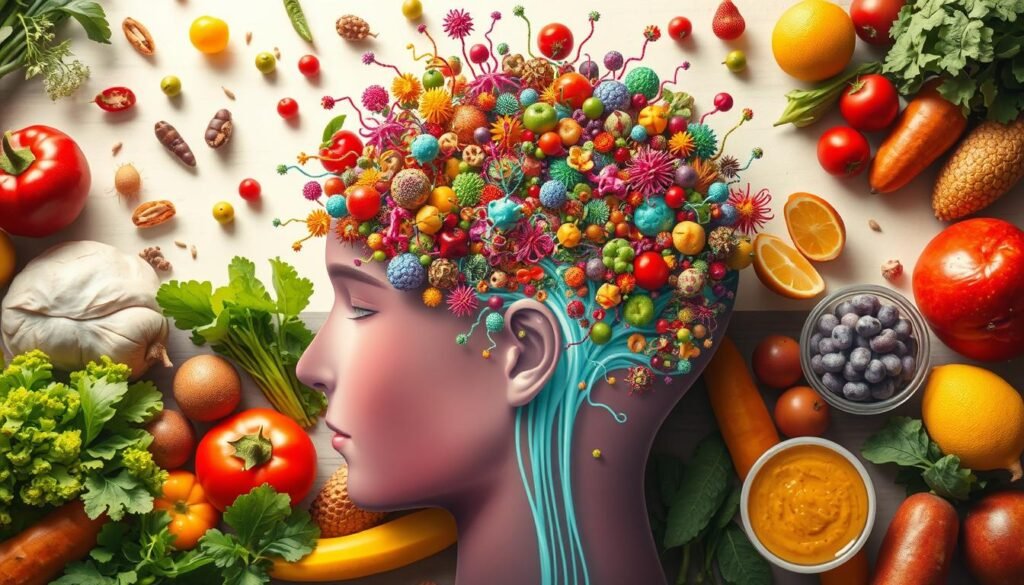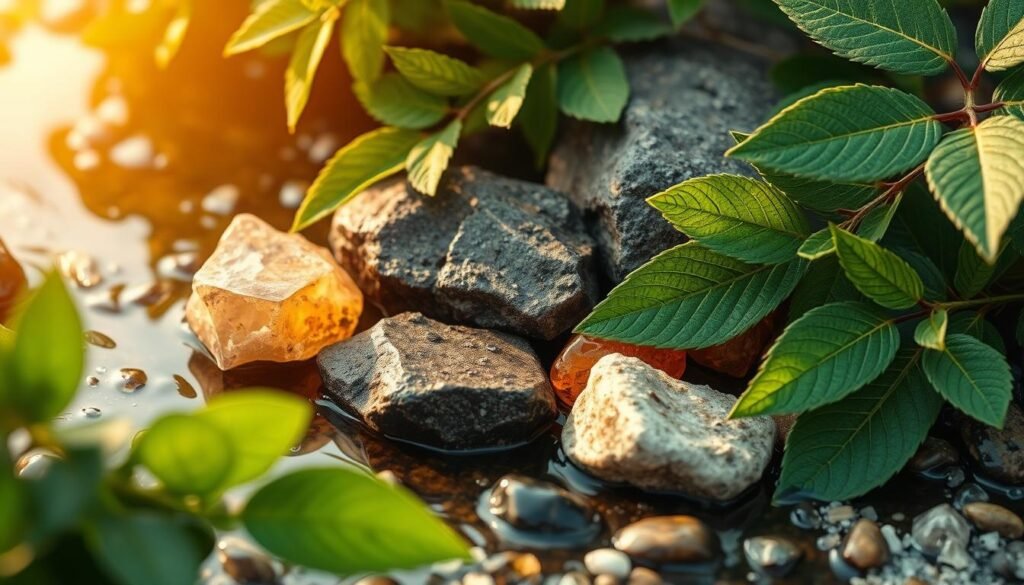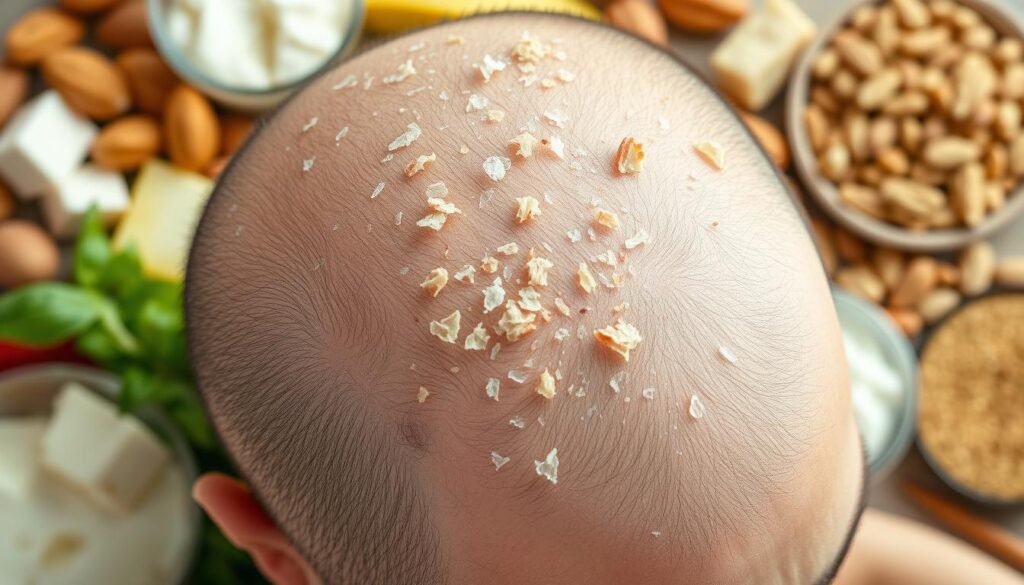Did you know almost half of everyone in the world will face dandruff at some point? It’s not just annoying, but it can make people feel embarrassed. But, there’s a twist. While you might look for skin treatments, what you eat could be key. This means your diet and dandruff connection matters a lot.
Some foods can make dandruff worse, like sugar and processed items. They help yeast grow, making flakes bigger. On the other hand, eating right, like fish rich in omega-3, can improve your scalp. Good foods bring vitamins and minerals that help fight off dandruff. Learning about these effects can change how you handle scalp flakes and boost hair health.
For more insights on linking diet and dandruff control, check this Dandruff Diet guide.
Key Takeaways
- Dandruff affects nearly 50% of people globally at least once.
- A diet rich in omega-3 fatty acids can help manage dandruff symptoms.
- Processed foods high in sugars may worsen dandruff by promoting yeast overgrowth.
- Essential vitamins like B6 and B12 aid in maintaining healthy skin.
- Probiotics can enhance gut health, which is crucial for scalp balance.
- Zinc and selenium are vital minerals that help reduce flakes and inflammation.
Understanding Dandruff and Its Causes
Dandruff affects about half of all adults worldwide. It leads to scalp flaking, oily flakes, and a lot of itching. This discomfort often comes from underlying skin conditions like seborrheic dermatitis. Those with oily skin, Parkinson’s disease, or HIV face a higher risk.
Eco factors play a role too. Cold, dry weather can make scalp flaking worse. Stress also adds to the problem. Plus, men get dandruff more due to androgen hormones stimulating their oil glands.
To treat dandruff, knowing the causes helps. Shampoos with ingredients like ketoconazole or zinc pyrithione are common. But, home remedies like apple cider vinegar or coconut oil also soothe the scalp. Eating foods rich in zinc and B vitamins is beneficial. If dandruff stays, a dermatologist’s help is a good idea.
Natural solutions can also ease symptoms. For tips on supplements for dandruff, check this informative resource.
The Connection Between Food and Dandruff
The link between what we eat and dandruff is getting a lot of attention. Dandruff Research shows that dietary choices impact dandruff. Dermatologists think that food affects scalp health a lot.
Expert Opinions on Diet and Dandruff
Experts are looking closely at how diet affects dandruff. Eating too much sugar and processed food can cause inflammation and dandruff. This is because they can make the body produce more oil, which is bad for the scalp. Dermatologists say eating right can help with dandruff.
Eating healthy foods might help people with dandruff feel better. This kind of “dandruff diet” is gaining interest among experts.
Linking Inflammation and Dietary Choices
It’s clear that bad diets can cause inflammation and dandruff. Eating too much sugar and fat is not good. Also, yeast in foods like bread and beer can make dandruff worse.
Eating foods with good fats, like omega-3 and omega-6, is helpful. They can make the skin better. Foods with zinc and biotin are important for a healthy scalp. Indeed, 72% of people with severe scalp issues see a link between their diet and dandruff. This shows how important diet is to scalp health.
Nutrition and Hair Health: Why It Matters
Nutrition is key to keeping hair and scalp healthy. It provides important nutrients that boost hair strength and growth. What we eat greatly affects our hair health. This includes avoiding problems like dandruff.
The Role of Nutrients in Scalp Health
Many nutrients are critical for healthy hair. They include:
- Protein: Since hair is mostly protein, we need at least 45 grams daily. This helps with hair production and less shedding.
- Zinc: Not having enough zinc can result in hair loss. So, it’s vital to eat zinc-rich foods like nuts and seeds.
- Omega-3 Fatty Acids: These are in fatty fish, like salmon. They help the scalp by feeding hair follicles and controlling scalp oil.
- Vitamins A and D: These vitamins are good for the scalp. You can get them from beef liver, fortified foods, and fatty fish.
Beneficial Foods for Hair and Scalp
Eating a variety of foods is good for our hair and scalp. Here are foods to add to your diet:
| Food | Key Nutrients | Benefits |
|---|---|---|
| Leafy Greens | Iron, Vitamins A and C | They boost blood flow to the scalp and keep it moist. |
| Nuts (e.g., almonds) | Zinc, Vitamin E | These support hair growth and shield the scalp from harm. |
| Fatty Fish (e.g., salmon) | Omega-3 Fatty Acids, Vitamin D | They improve scalp health and lower inflammation. |
| Whole Grains | B Vitamins, Zinc | Help in keeping energy up and making hair stronger. |
Adding these foods to your diet can help your hair nutrition. This can lead to a healthy scalp. By focusing on nutrition and choosing the right foods, you can avoid many scalp problems, including dandruff.
Sugars and Processed Foods: The Hidden Dandruff Triggers
Many may not know how sugars and processed foods affect scalp health. These food choices can trigger dandruff by impacting insulin levels. When insulin is high, it may make the scalp oilier, leading to more flakes.
Studies show that diets full of fats, sugars, and processed foods could make dandruff worse. They increase oxidative stress and can raise the levels of Malassezia fungus. This fungus and more dead skin cells flaking off can cause severe dandruff.
Eating less processed foods and sugar helps not just your overall health but your scalp too. It’s smart to talk to a health expert about how diet affects your scalp. Readers can learn more about diet and dandruff by checking out this informative article.
For a healthy scalp, eat various nutritious foods. Focus on fruits, veggies, and whole grains for better hair. Foods rich in antioxidants can fight the oxidative stress linked to dandruff.
Essential Fatty Acids and Their Impact on Dandruff
Essential fatty acids, like omega-3 and omega-6, are key for healthy scalps. They help keep the skin moisturized. This moisture is important to prevent dandruff. Adding these fats to your diet is good for your scalp and overall health.
Sources of Omega-3 and Omega-6 Fatty Acids
You can find omega-3 and omega-6 in many foods. Here are some good sources:
- Fatty fish such as salmon, mackerel, and sardines
- Flaxseeds and chia seeds
- Walnuts and sunflower seeds
- Avocados
- Vegetable oils like flaxseed oil and sunflower oil
These foods help keep your skin stretchy and reduce swelling. This is great for people fighting dandruff.
Benefits of Fatty Acids for Scalp Health
Eating omega-3 and omega-6 does more than make you look good. It helps by:
- Reducing dryness and flakiness in the scalp
- Lowering inflammation, helping with dandruff
- Encouraging healthier hair growth
By eating the right fats, you can better handle dandruff. For more tips on fighting dandruff, check out this resource.
Probiotics and the Scalp Microbiome
Learning about probiotics and their role in a healthy scalp is key. Probiotics are good bacteria that rebalance the scalp’s microorganisms. This balance is vital for hair growth and keeping dandruff at bay.
How Probiotics Support Scalp Balance
A healthy scalp has more Propionibacterium and less Staphylococcus. But, with dandruff, there’s more Staphylococcus epidermidis. This shift matters. Good bacteria help the scalp absorb important nutrients. Probiotics are crucial in managing this balance.
Malassezia, often linked with dandruff, thrives when the microbiome is off. Stress and wearing hats can also mess with the balance. Eating probiotic foods or using them on your scalp can help. This approach shows promise for healthier scalps and combating hair loss.
Keeping your scalp hydrated is crucial for a healthy microbiome. A balanced microbiome leads to better hair growth. Research across different groups supports this. Adding probiotics to your daily care can prevent dandruff and improve scalp health overall.

Vitamins and Dandruff Reduction
Maintaining a healthy scalp is crucial for effective dandruff reduction. Specific vitamins are key to scalp health. The B-vitamin complex, especially biotin, is vital. Biotin makes hair strong, reducing brittleness and preventing hair loss.
Vitamin deficiencies and dandruff’s direct connection is yet to be proved. However, several vitamins boost the immune system and fight inflammation. These actions can alter dandruff severity. For example, lacking Vitamin D and some B vitamins might worsen scalp issues.
Vitamin E has healing effects that help lessen scalp flakiness. Using hair masks with Vitamin E-rich essential oils has benefits. It combats inflammation and nourishes the scalp. Eating foods full of healthy fats, vitamins, and minerals is crucial. It supports the body and enhances scalp health. Important food sources are:
| Vitamin | Function | Food Sources |
|---|---|---|
| Vitamin A | Keeps skin healthy and moist | Carrots, sweet potatoes, spinach |
| Vitamin B12 | Lessens fatigue and improves hair health | Meat, dairy, eggs |
| Vitamin C | Strengthens immune function and healing | Citrus fruits, strawberries, bell peppers |
| Vitamin D | Aids bone density and health | Fatty fish, fortified foods, sunlight |
| Vitamin E | Enhances scalp health and fights flakiness | Nuts, seeds, spinach |
Adding these vitamins to your daily diet aids in fighting dandruff. Pairing with proper treatments like anti-dandruff shampoos brings the best results. This combo leads to healthier hair and a joyful scalp.
Minerals and Dandruff Control
Keeping your scalp healthy is more than just regular shampooing. You need certain minerals for dandruff prevention and scalp health. Zinc and selenium are very important. Zinc helps keep the skin healthy and reduces dandruff. Selenium fights against fungal growth, which often causes dandruff.
Key Minerals for a Healthy Scalp
To have a healthy scalp, certain minerals are essential. Here’s how they help:
- Zinc: It controls sebum production, helping to reduce dandruff by managing oil on the scalp.
- Selenium: It helps fight yeast overgrowth, which can lead to flakes.
- Iron: Iron boosts blood circulation. Not having enough can harm scalp health and increase dandruff.
Common Food Sources for Essential Minerals
Finding foods rich in these minerals is easy. Here are some good sources:
| Mineral | Food Sources |
|---|---|
| Zinc | Oysters, red meat, poultry, beans, nuts, whole grains |
| Selenium | Brazil nuts, seafood, eggs, sunflower seeds, wheat germ |
| Iron | Red meat, legumes, tofu, spinach, fortified cereals |

Adding these foods to your meals can lead to a healthier scalp and less dandruff. Eating well helps keep your scalp and body healthy.
Dietary Changes for Dandruff Management
Effective dietary changes are key in managing dandruff. A diet aimed at a healthy scalp can reduce symptoms like dryness and itching. Including healthy fats in your diet is a good start. Foods such as salmon, mackerel, and walnuts are rich in omega-3 fatty acids. These help keep sebum levels normal, reducing dandruff.
Eating foods high in protein is also crucial for scalp health. Poultry and tofu are excellent choices. Eggs are full of zinc and biotin, nutrients that help control sebum production. This promotes a healthier scalp. Also, adding various fruits and vegetables to your diet is beneficial. Citrus fruits, berries, and green veggies provide vitamins that fight oxidative stress. This stress can affect your scalp’s health.
Cutting down on sugar and processed foods is important. Such foods can lead to inflammation and dry scalp. Processed items tend to have unhealthy fats and additives that may increase dandruff. Instead, focus on whole foods and the healthy fats found in avocados, nuts, and olive oil. These support your scalp’s hydration and health.
Probiotics in foods like yogurt can boost your immune system. A strong immune system is crucial for fighting dandruff caused by fungal infections. Implementing these dietary changes can greatly improve your dandruff situation. Small adjustments can lead to significant benefits. They ensure a balanced environment that fosters a healthy scalp.
Allergies and Flaky Scalp: Understanding the Connection
Allergies and dandruff are closely related, leading to various scalp issues. Common triggers can cause flaky scalp, which can worsen by allergic reactions. This creates a challenging cycle of itchiness and inflammation. Foods like cow’s milk, gluten, and spicy foods can trigger allergies for some, causing dandruff to flare up.

To manage sensitive skin, it’s crucial to know how diet affects scalp health. Not eating the right foods can lead to a flaky scalp. For example, not getting enough Vitamin B6 and B12 can make dry scalp and dandruff worse. It’s important to watch what you eat to avoid allergic reactions that make the scalp too dry or too oily.
If you’re dealing with these issues, watch for signs of allergies like strong itching or redness. These symptoms could point to a dietary problem, not just normal dandruff. Taking steps like adding nutritional supplements, cleaning your scalp regularly, and staying away from foods that cause allergies can help your scalp stay healthy.
| Allergy Triggers | Potential Symptoms |
|---|---|
| Cow’s Milk | Itchy, flaky skin; redness |
| Gluten | Dry patches; increased scalp flaking |
| Spicy Foods | Inflammation; discomfort |
| Nuts | Swelling; irritation |
| Eggs | Flaky skin; redness |
Understanding how allergies link to a flaky scalp helps individuals find dandruff relief and improve scalp health. Knowing this connection offers better strategies for individual care.
Conclusion
About 13 million Americans deal with dandruff. It’s key to know why it happens and how to treat it. This in-depth look has shown how diet and scalp care play big roles. Eating right helps the whole body, including the scalp.
To better handle dandruff, a full health plan is needed. This includes eating well and taking care of your hair. Using products with zinc pyrithione and salicylic acid is helpful. Apple cider vinegar might help balance scalp pH too.
Knowing more about dandruff helps people deal with it better. If you want more information, check out studies here. With the right knowledge and care, anyone can fight off dandruff and feel better.